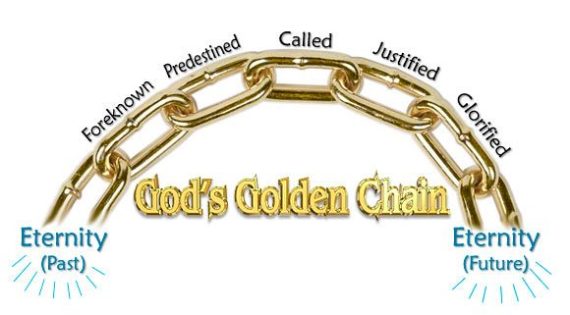The Doctrine of ‘Once saved always saved’ is one which is embedded in the belief that when a person commits his or her life to Jesus Christ, accepting Him as their personal Saviour, then eternal salvation is totally assured from that moment on, with absolutely no possibility of ever losing it. It is a topic which I see heavily debated in many Christian circles and one I believe after a careful and thorough examination of scripture becomes very clear . So let’s examine scripture and understand truth.
What is a Christian?
The biggest problem we face when it comes down to discussing this question is that we have so relegated the meaning of what it means to be ‘Christian’ . A Christian is not defined as someone who raised their hand at an alter call and repeated a few prayers. A Christian is not defined as someone who grew up in a Christian home and believes in God by proxy. A Christian is not someone with high moral values who performs religious duties. Rather, a Christian is someone who was once dead in their sins and trespasses (Eph. 2:1), someone whom as descendent of Adam and Eve, joined them in their rebellion and as a result shares in their guilt and corruption, (Rom. 5:12–21), someone who as result of this was an enemy of God (v. 10), and by nature deserving of His wrath (Eph. 2:3). A Christian is someone whom in-spite of all these things, just at the right time, Jesus Christ paid for their sins and drank the cup of God’s wrath for ( Mark 10:45) . A Christian is someone who by faith, through the person and purpose of Jesus Christ, through his life, death and resurrection is now reconciled, Justified and soon to be Glorified. And where you were once an enemy of God, instead you are now an adopted child of God. A Christian is someone who is redeemed, marked and sealed by God and born again. A true Christian is a person who has now put faith and trust in the person and work of Jesus Christ, including His death on the cross as payment for sins and His resurrection on the third day.
So what is Salvation and can a Christian lose it?
“Salvation is by Grace alone, through Faith alone, through Christ alone, according to Scripture alone for the Glory of God alone”
Ordo Salutis
Salvation simply put is the divine and sovereign act of God where He redeems, rescues and delivers sinners through the person and purpose of Jesus Christ. Salvation is not simply a response you made to an altar call — which although was necessary was not the beginning. However, Your salvation was something which was unfolding before the very foundations of the universe was formed. Your salvation began in eternity past when God planned the history of redemption, and ordained the death and the resurrection of his Son, and He chose you to be his own through Christ.
Romans 8:29-30 gives us the Ordo Salutis – Order of Salvation, which is often referred to as the ‘Golden Chain of Salvation’. Simply put it is the blueprint of how God saves and redeems His people. “Those whom he foreknew he also predestined to be conformed to the image of his Son… And those whom he predestined he also called, and those whom he called he also justified, and those whom he justified he also glorified.”- Romans 8:29-30.

To answer the question as to whether a Christian can then lose their salvation, it is important to note that this ‘The Golden chain of Salvation’ referred to above is fully God’s. He designed and orchestrated it. God didn’t just simply create each of the links and then depend on man’s ability to connect them, but instead He binds the links them together Himself ,through His own power, purpose and love. It is God who Foreknew, It is God who Predestined, it is God who Called, it is God who Justified and it is God who Glorifies. Salvation is all about God!
God is the centre of our Salvation. To believe that you can lose your salvation proceeds to displace God from the centre and to instead place man and his works at the centre. The bible couldn’t be more clear on the matter. We contribute nothing towards salvation, it is sola gratia — by grace alone. As Ephesians 2:8–9 says, “For it is by grace you have been saved through faith. It is not from yourself or anything you’ve done, but the gift of God.” Salvation, therefore, is a free gift of grace from God and God’s gifts are “irrevocable” (Romans 11:29). Once made born again and made new, a Christian cannot be un-newly created. Once you have been redeemed a Christian cannot be un-purchased. Once granted Eternal life a Christian cannot become temporary. God is infallible and thus cannot renege on His Word (Titus 1:2).
The idea that salvation is totally of God and is the result of nothing that anyone does is one which is hard to come to terms with. It is counter-cultural– for many of us it almost seems too easy. The concept of Grace is one which most of us struggle with; human nature almost demands us to add something onto the end. I don’t imagine many Christians reading this disagree on the matter that it is God’s grace is which saves people. Where I often find disagreement, is over what a person’s role in this whole process is. The issue which has split the Christian Church has always been whether faith by itself is sufficient for salvation and as a result many through the ages have felt compelled to add onto the central message of Christianity. This is what separates Christianity from every other world religion. Everyone religion at its very core has the same message, they all aim to answer the question ‘ How does man become right with God’ or ‘ How does man obtain Favour from God’. Every other religion is focused on what man must do, but Christianity is centred around what God has done. Christianity proclaims that there is nothing you nor I can do, no amount of religious deeds would be enough to earn God’s Favour or to become right with him. As Jonathan Edwards famously says “You contribute nothing to your salvation except the sin that made it necessary.” The Christian message is that when a person accepts the free gift of salvation by virtue of faith, he or she is said to be justified — made acceptable before (or made right with) God. The process of being declared righteous is called justification.
It is vital that we understand and distinguish between Justification and Sanctification. They are big theological terms which unfortunately many Pastors today fail to use today because they believe people can’t grasp them. However, understanding these terms is crucial to understanding the Christian message and is the very difference between assurance in salvation and doubt.

Justification: Freedom from Sin’s Penalty
Justification is a legal term. It is a definitive and immediate pronouncement where we are now vindicated and determined to be sinless in the eyes of God. The righteousness of Christ is imputed on to us (Romans 3:22) and now our sin no longer separates us from Him and no longer sentences us to hell. Justification is not earned by any work or effort on our part; otherwise, it could not be called grace. If our good works earned salvation, then God would be obligated to pay us our due. But no one can earn heaven, and God’s blessings are not His obligation; they flow from His goodness and love.
Sanctification: Freedom from Sin’s Power
Sanctification is a practical experience of our separation unto God. Because by virtue of faith we have been justified, we are positionally holy (“set free from every sin” (Acts 13:39), however we know that we still sin (1 John 1:10). Sanctification is now the life long process by which we are conforming to the image and likeness of Christ where God guides us to maturity and progressive holiness.
Understanding these two terms is crucial in the life of every believer. A failure to understand the distinction between the two would lead to all sorts of issues later on in our walk. Once our understanding of Justification and sanctification becomes lost, so does any hope we have to understand the Christian faith.
- Justification happens outside of you, you are declared righteous.
- Sanctification happens inside of you, you are made righteous.
Justification in light of the question ‘can a Christian lose their salvation’
Those who have been justified never need re-justifying. When you have been justified you are at peace with God (Romans 5:1) and know that there is no condemnation for those who are in Christ Jesus (Rom. 8:1–2). The term ‘no condemnation’ is in fact a double negative. So in fact ‘ no condemnation’ actually means a ‘positive judgement’. Where you were once condemned into hell, you are now seated in heavenly places with Christ (Romans 6:4). It is a definitive judgement made by God and you can now be assured of your salvation. It is the glorious truth of the Gospel, there is nothing you can do to get yourself in Christ, and therefore there in nothing you can do get yourself out of Christ.
Be assured of your justification. It was. One day, you were freed fully from the penalty of sin.
Be patient with your sanctification. It is. Each day, you are being freed increasingly from the power of sin.

Perseverance of the saints
Every time I have a discussion regarding the doctrine of ‘once saved always saved’, there are two main objections to the belief. Firstly, what about Christians who live in deliberate sin and have an unrepentant lifestyle? Secondly, what about Christians who at one stage in their lives professed they were in the faith and but have since now publicly denied Christ?
The problem with these objections is the assumption that everyone who calls themself a “Christian” has actually been born again. This is why I considered it important at the very start to spend some time defining what a “Christian” is. The Bible clearly states that a true Christian will not live in a constant state of continual and unrepentant sin (1 John 3:6). As for the second question, The Bible is very clear on this. The Bible says that anyone who claims they have since departed the Christian faith has demonstrated that he or she was never truly a Christian in the first place (1 John 2:19). The person may have had an outward appearance of Christianity, they may have simply been religious and put on a good show, but they were never truly redeemed, rescued and born again by the power of God.
So this then begs the question, ‘how can we know whether or not someone genuinely is born-again,justified and is a child of God?’. ‘Perseverance of the saints’ is a doctrine embedded in the belief that a genuine believer will persevere in the faith and in holiness until the very end. It doesn’t mean perfection, it doesn’t mean a sinless life but it means that God is faithful to complete the work he began in us (Phillipians 1:6). This goes back to the notion that God is the centre of our salvation. The doctrine of ‘ Once saved always saved’ is not a get out of jail free card, it is not a vaccination meaning, now that you have your shot you can do whatever you like. It is that instead that God is preserving us, he is the author and finisher of our faith (Hebrews 12:2). He doesn’t simply save us and then leave us on the shelf, but He is actively working and perfecting the work he began in us until the return of Christ Jesus (Phillipians 1:6). It is our assurance in the finished and justifying work of Jesus Christ which fuels us to persevere in the faith. It is important that we grasp and hold on to this message. Justification comes before Sanctification. We mustn’t get this the wrong way round, we do not persevere and work to gain favour and approval from God, but instead we work from a place of favour and approval. This is what fuels us to run the Christian race, knowing and understanding that it is already done.
In the simplest terms, perseverance is the proof of salvation. A Christians’s perseverance in the faith and obedience to the word, is evidence of their vital, saving connection to Christ and their participation in him.

So to the person who is reading this, doubting their salvation, ask yourself, are you trusting in Christ? ultimately we hope that this article will help you navigate this discussion and leave you marvelling at the miracle of Salvation.

















